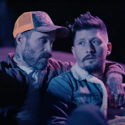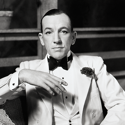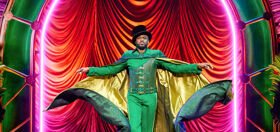
Out twenty-three year-old, singer/songwriter, Chris Garneau ditched his Broadway dreams in favor of supporting of his own album of originals, Music for Tourists.
Produced by Duncan Sheik, Music is a quiet record of small epiphanies performed on not much more than a piano and sung in Garneau’s unmistakable, intimate tenor. With the record on its way, a fall tour, and an unofficial record release party at Joe’s Pub in New York City, on October 13th, Garneau’s got no regrets.
After the jump, Garneau sits down with freelance writer, Ryan Doyle to discuss what it means to be a gay artist with more to sing about than being gay, how he’s more than just a pretty face, and the secret behind never falling out of love.
Ryan Doyle: I noticed your phone number has a Massachusetts area code. Are you originally from Boston?

Chris Garneau: I am originally from Boston. I lived there until I was about eight or nine. Then, my family moved to France for a few years because of my father’s work. From there I moved to New Jersey for middle school, high school. I went to Boston briefly after high school, because I thought I was going to maybe study at Berklee, but within a few short weeks, that ended. By the next summer, I was back in New York. I’ve been here since then.
How about we take this to the next level?
Our newsletter is like a refreshing cocktail (or mocktail) of LGBTQ+ entertainment and pop culture, served up with a side of eye-candy.
RD: Why the delay on the release of Music for Tourists?
CG: We started making it, Duncan [Sheik] and I, about two years ago. Duncan is a very busy man. So, there was a lot of downtime during the recording process where he wasn’t in town. It was frustrating for me to not be able to get the record done quicker. On the other hand, looking back, I was able to write newer songs [that] replaced older ones. I don’t regret any of the times when I was frustrated, because in the long run we made the best record that we could make.
RD: Did Absolutely Kosher Records ever want you to push the “gay card”?
CG: No, not at all. We discussed it just for my own benefit. They just asked out of appreciation and respect for me, if that was something I was planning on being open about. My response to that was, if they ask, I have no problem telling anybody anything. I would never lie to anybody about it, but it’s not the marketing ploy for my record. Anyone who is suddenly portrayed in a way that’s based upon their sexuality alone suddenly becomes non-musical. Unless you’re getting into the politics of it which, of course, then it’s really important. Queer bands and artists have something to say. I have things to say on the matter, but just not as blatant as other artists. It’s no secret, I guess. It’s just not the basis of why I’m making music.
[Video For Garneau’s Track, “Relief”]
RD: A friend of mine has this belief that if you want your record to sell, and given that you’re photogenic, you have to put your face on the cover. Is there any reason why you choose to not have a picture of yourself on the cover of Music for Tourists?
CG: I’ve had a few years to think about that… I wouldn’t hope that my face being on the record might help sell any records. Hopefully it doesn’t matter to anyone what I look like. I wanted the cover art to be stuff that I really liked. It’s kind of cartoon-esque, a little bit on the humorous side. I always like to keep it kind of light. So it wasn’t really an interest of mine.
RD: Do you feel that you have a gay following?
CG: The following itself is so across the board. There’s definitely a part of my following that’s gay, for sure, but it doesn’t make up the majority, by any means. It’s from fourteen-year-old girls to thirty-five year old yuppies. In the middle there’s gays and hipsters. It’s really just a weird mix of people.
RD: If you don’t mind discussing, what were your reasons for dropping out of Spring Awakening?

CG: Spring Awakening was a project I was involved in since it’s very beginning in New York. I was in high school the first time I started with it. I had been acting and doing the whole thing–musical theater. I never really loved any of it, but I didn’t know what else I was supposed to be doing at the time. I enjoyed that more than anything else. I was doing workshops while I was in high school. Then, a few years later, we did another workshop with a performance at Lincoln Center. That was about a year or two ago.
And then this past winter, they started to go into full production and that commitment was something that I thought I was going to be able to do. We had a little break between rehearsal and full production [during which] I toured for a few weeks on the West coast. When I came back, I had signed to Absolutely Kosher, and realized that the commitment that I had to make for my own career and my record coming out would be too big of a task while performing.
So I resigned from the project, which wasn’t the easiest decision to make. I felt really bad about it, but I would’ve felt worse staying there without being 100% and giving my all. I liked the project and Duncan Sheik, who produced my record, is the composer, so there was that working relationship we had.
RD: Your sound doesn’t strike me as having anything to do with musical theater, particularly your voice. Were you always writing songs?
CG: I was, since my early days of high school, writing my first songs. They were very different and very bad. They had more of a cabaret, musical theater aspect to them. As I got older and started opening my mind up to new music, I started to realize what kind of music I loved. I started going in that direction and left behind some of the things I didn’t care for anymore.
RD: What are your influences? But the rule is, you can’t name any piano players.
CG: I brought my ipod for this question, because whenever people ask me I get disoriented to the point where I can’t even remember who’s influenced me. Early on, the first few things I was listening to out of high school were Jeff Buckley and Nina Simone–oh, I’m sorry, she’s a piano player. I’m so terrible at this question. It really gets me. Blonde Redhead is one of my favorite bands ever. And it’s not like I have anything to do with them musically, but just having them in my life for so long, there has to be something happening in there. Chan Marshall is a big influence of mine; I know that’s totally the piano thing, but just her songwriting alone…
RD: Do you find it easier to write a love song when you’re in love or out of love?
CG: I’ve only been in love once, and I still am. I never fell out of it so I can’t answer the question exactly. It’s been a tricky few years, but a lot of the songwriting that has taken place over the past few years has–if there’s talk of love or loss thereof or missing or hoping or any of that stuff, you can probably assume that it’s about the one person.
RD: What are your plans between now and the start of your tour?
CG: We have this next month of interim, so since I have so much new [material], and we play a lot of the new stuff at shows, we’re going to go make the second record. My band mate and I are producing it. We’re going to go up to the mountains in New Hampshire and record all or most of it in September. And if everything gets done in the next half year, it can come out at the end of 2007. That’s the plan right now. I want to stay on top of everything as much as I can.
Chris Garneau’s record is available on his website starting in October. It will be available in shops January, 2007. To experience him live, Garneau plays October 13th, at Joe’s Pub in New York City: 425 Lafayette Street, 212-539-8778. $15 cover.


















Karen
Hi
You asked who Chris’s followers are…I’m in my 50’s, straight, married , kids, grandkids…He is so talented , and such a good person, I’m a HUGE fan!
sherwin
hi
chris is ablsolutel y amazing and wishing that i could have seen him again one more time, cuz he is absolutely talented a one of a kind of musician.
-sherwin
Jason
his work is simply amazing, and touches so much more than just the ears. Its so beautiful, and I hope I get see Chris in person someday.